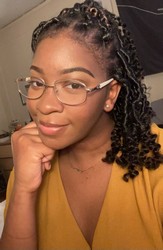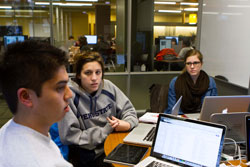Political science graduate, Esosa Ruffin ‘20, has recently secured a graduate fellowship at the New Jersey Office of the Secretary of Higher Education (OSHE).
Ruffin, who accepted the position in September, said, “I wanted to become a member of the OSHE team because I am really passionate about the policy and issues that this office addresses. I wanted to learn more about how I can make a positive impact for students like myself and give them a voice.”
A native of East Orange, NJ, Ruffin chose to attend Monmouth because of the connection she made with the Educational Opportunity Fund Program (EOF) staff, as well as the benefits of the program.
She said, “While I’ll certainly advocate for the Educational Opportunity Fund Program until my last breath, I am not sure I dawn the title of ‘EOF Advocate’ just yet, as there are many individuals who have rightly earned this title for their extensive lobbying efforts for the program throughout the years…I just try to do my best to explain to people what an amazing access tool EOF is and how it has shaped my life and the lives of countless others.”
During her time at Monmouth, Ruffin was a Summer Intern for Congressman Frank Pallone Jr., Public Policy Intern for the Council for Opportunity in Education, Lead Organizer for Monmouth Pell Recipients for CARES Aid (MPRCA), Senator for the Student Government Association (SGA), and President of Alpha Kappa Alpha Sorority, Inc. Tau Eta Chapter.
After declaring her major sophomore year, Ruffin completed an independent study as a junior with Stephan Chapman Ph.D., Assistant Professor of Political Science, on the “Politics of Higher Education.” This influenced her to develop a deeper understanding of this particular field.
She came across the graduate fellowship opportunity while doing research for her honors thesis and believes that education is an asset for all individuals regardless of their background.
She said, “It is often said that ‘Knowledge is Power,’ but perhaps this is even an understatement. In our current social and political climate, knowledge can be the difference between social mobility and social stagnation. The more information and tools an individual has access to, the better situated they will be to improve their circumstance. This is not to say it is the duty of any one individual to pull themselves up by their bootstraps, but rather it is the responsibility of our policymakers to make educational attainment a priority in order to make social mobility possible for vulnerable student populations.”
Johanna Foster, Ph.D., the Helen McMurray Bennett Endowed Chair in Social Ethics and an Associate Professor of Sociology,,, believes that Ruffin has a level of maturity, drive, moral, and a distinguishable skill set that really sets her apart.
She said, “[Ruffin] has a tremendous mind for analyses of power, and a real skill at policy and program analysis that makes folks in the Department of Political Science and Sociology proud. She knows more about the politics of higher education than almost any student I’ve met in 25 years of teaching. To tell you the truth, she has insights already that many of us higher education veterans have yet to grasp.”
Foster also believes that citizens who advocate for separation and inequality prevent society from moving forward and coming together. She said, “Inequalities generate inexcusable harm on a massive scale, and included in those harms is what happens to all of us, no matter who we are, when the kind of talent and promise that students like Esosa bring is overlooked.”
Foster continued, “I’m so glad Monmouth didn’t make that mistake here, as it is clear that if she weren’t a member of the MU community, both as a student and now as an alum, we would have lost an enormous asset to our classrooms, an inspired student leader, and just the chance to get to know a really fantastic person.”
Ruffin offered motivation for students to become engaged in community involvement and take interest in their own education, “I would say you have already begun to do the work. By taking an interest in your own education, you have become involved in higher education. College campuses, and really higher education in general, is just a hub that is reflective of everything going on in the world around you. The more you begin to ask questions about why certain things are happening on your campus, the more involved you will become.”
Ruffin said that higher education specifically has become increasingly unattainable to underrepresented minorities, low-income students, and students with disabilities.
She said, “Overall, quality education needs to be accessible to all— not just the white, wealthy, or able-bodied. OSHE has already begun to address a number of changes that need to be made in its Higher Education State Plan.”
Ruffin explained that these changes reflect Governor Murphy’s economic plan for a ‘Stronger and Fairer Economy in New Jersey’ as well as New Jersey’s figurative ‘Student Bill of Rights,’ which covers early exposure to college, affordable and predictable education costs, and creating safe, supportive, and inclusive college campuses.
Ruffin is currently working remotely for the office and hopes to learn a lot from higher education experienced professionals. This will prepare her for an aspiring career as an attorney while still working in higher education to enhance opportunities for students who face challenges in attaining post-secondary education.
PHOTO COURTESY of Esosa Ruffin




